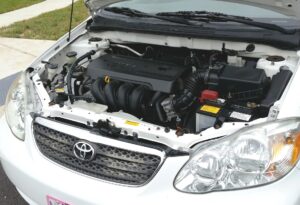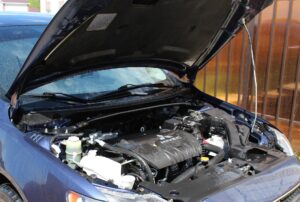If you’ve ever had a car battery die on you, then you know how frustrating it can be. Not only is it a pain to have to jump-start your car, but it’s also dangerous. One of the most common causes of car battery corrosion is leaving your lights on. This happens when the battery isn’t able to fully recharge because there is something drawing power from it, such as a light or electronic device. In this blog post, we will discuss how to clean car battery corrosion and help extend the life of your battery!
What is car battery corrosion?
Corrosion on a car battery can be unsightly, but it’s also a sign that the battery is wearing out. Corrosion occurs when the metal plates inside the battery are exposed to air and moisture, causing them to oxidize. This process creates a buildup of white or blue powder on the terminals, which can eventually lead to problems starting the engine.
Fortunately, there are a few simple ways on how to clean car battery corrosion. One method is to use a solution of baking soda and water. Simply mix equal parts of baking soda and water together, and then use a toothbrush or other soft brush to scrub away the corrosion. Another option is to use a commercial battery cleaner, which you can find at most auto parts stores. Simply follow the instructions on the cleaner, and then rinse off any residual cleaner with water.
Whichever method you choose, be sure to clean both the positive and negative terminals of the battery. Once the terminals are clean, apply a thin layer of petroleum jelly to help prevent further corrosion. With regular cleaning, you can keep your car battery in good condition for years to come.
The causes of car battery corrosion

Corrosion on a car battery is caused by a buildup of electrolytes on the battery’s terminals. This can happen when the battery is exposed to moisture or when it’s not used for a long period of time. The corrosion creates a barrier between the battery and the car’s electrical system, which can eventually lead to starting problems.
If you notice corrosion on your car battery, it’s important to clean it off as soon as possible. You can clean corrosion off with a toothbrush or a wire brush. First, disconnect the negative terminal of the battery and then clean the corrosion off the terminals with the brush. Once the terminals are clean, reconnect the negative terminal and coat the terminals with petroleum jelly to help prevent future corrosion.
How to clean car battery corrosion

Over time, car batteries can develop a build-up of corrosion around the terminals. This can cause problems with starting the car, as well as damage to the battery itself. If you notice corrosion on your battery, it’s important to clean it off as soon as possible. The good news is, that it’s relatively easy to do with a few simple household materials.
First, start by disconnecting the battery terminal from the battery itself. You’ll need a wrench to loosen the nut on the positive terminal, and then you can pull the terminal away from the battery. Once the terminals are disconnected, use a brush to remove any visible corrosion from the terminals and battery posts. You can also use a rag to wipe away any corrosion that’s difficult to reach with the brush.
Next, mix up a solution of baking soda and water. Use a ratio of 1 tablespoon of baking soda for every cup of water. Dip a rag into the solution and use it to scrub away any remaining corrosion from the battery terminals and posts. Rinse the area with clean water to remove any residue and dry it off with a clean cloth.
Finally, reconnect the battery terminals and tighten them down with the wrench.
Preventing car battery corrosion
As any car owner knows, the battery is one of the most important parts of the vehicle. After all, it’s what gives the car the power it needs to start up and run. However, batteries can also be susceptible to corrosion. This happens when the metal terminals come into contact with moisture, causing a buildup of white or blue-green crystals. If left unchecked, corrosion can eat away at the battery terminals, causing serious damage.
Fortunately, there are a few simple steps you can take to prevent this from happening. First, make sure the terminals are always clean and dry. Second, if you notice any corrosion starting to form, remove it immediately with a wire brush or other abrasive tool. By taking these simple precautions, you can keep your battery in good condition and prevent any costly repairs down the road.
Tips for extending the life of your car battery

Over time, car batteries will naturally lose some of their charges and eventually need to be replaced. However, there are a few things you can do to help extend the life of your battery. One way is to keep it clean. Over time, car batteries can develop corrosion, which can lead to a loss of power.
How to clean car battery corrosion? To clean corrosion, simply mix equal parts of baking soda and water and apply it to the affected areas with a brush. Once the corrosion has been removed, be sure to rinse the area with clean water. Another way to extend the life of your car battery is to avoid short trips. Starting and stopping the engine uses up a lot of power, so try to combine errands into one trip whenever possible.
Finally, make sure your tires are properly inflated. This may seem unrelated, but underinflated tires can actually put extra strain on your battery. By following these simple tips, you can help ensure that your car battery has a long and healthy life.
Signs that your car battery needs to be replaced
If your car battery is more than three years old, it’s a good idea to have it tested annually to ensure that it’s still in good working condition. However, there are also a few signs that your battery may be starting to fail and will need to be replaced soon.
For instance, if your car is slow to start or the headlights are dimming, it’s likely that the battery is losing its charge. Another sign of a failing battery is corrosion on the terminals. This can prevent electrical current from flowing freely, causing starting problems. If you notice any of these signs, it’s best to take your car to a mechanic for a battery test. If the battery fails the test, it will need to be replaced.
Read More;
